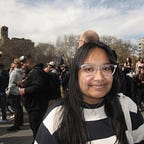The Global Health Benefits of Dance
Edited by Maddie Lee
This article was originally published by the New York University chapter, in Edition 002.
From the elegant waltzes in Vienna to the face-paced Capoeira in Brazil, humans share a common language — dance. Dancing is not only a celebration of what makes us unique, but also a celebration of what brings us together. All of us live on one big dance floor. From sacred dances passed down through several generations to new trends on Tik Tok, in moments of joy, we transcend our cultural bounds and dance.
Besides being a fun way to shake off some energy, there are several health benefits that have connected to dancing. These benefits can help create healthier societies across the world.
Dancing around, even if it does not always feel like it, is exercise. It gets your blood flowing, your muscles moving, and your heart pumping. Regular moderate-intensity dancing leads to a decreased risk of cardiovascular disease over time by helping people lower their BMI and psychological stress, both factors that play into cardiovascular disease (Merom et al, 2016). According to the Harvard Health Publishing from Harvard Medical School, dancing can even improve your balance and your coordination by activating the brain’s motor circuits [3]. Cardiovascular disease is the leading cause of death for men and women in the United States [2], having a way to combat it which is accessible to many people such as dancing is essential to improving the health of the nation as a whole.
Furthermore, dancing can improve your mental health. A study conducted in 2022 measuring cortisol levels in saliva after an African dance class showed that dancing can release cortisol in your brain, the hormone that is responsible for decreasing levels of stress, anxiety, and depression. Cortisol also promotes awakeness throughout the day and decreasing levels at night promotes sleep [4]. Next time you feel the stress deadlines and exams creeping up on you, cut loose and bust a move, it may end up helping more than you think! Memorizing the steps in a complex dance like the Brazilian Capoeira which combines aspects of martial arts and percussion [1] can exercise the muscles in your brain. According to a 2003 study published by the New England Journal of Medicine the simple task of learning a new dance has been shown to decrease the risk of brain diseases like dementia more effectively than other free physical activities like walking, doing housework, and swimming [6]. As we see an increase in the elderly population and dementia, having resources to prevent dementia and other mental illnesses will become essential to maintaining a healthy society. Dancing can help promote a healthy and happy society.
However, the benefits of dancing transcend the mental and physical — dancing can boost your social activity too. Perhaps you are dancing at a party with people that you have never met before, or maybe you created a dance with your siblings when you were little. Those dances help foster a sense of community and solidarity. Furthermore, learning a traditional dance from your own culture is a great way to learn more about yourself, it also makes a great trick to show your friends and family later on. For example, I learned some Bollywood dance moves with my cousins last winter which taught me some new songs from my culture! The experience was very rewarding and brought me closer to my family.
There does not need to be a major time commitment involved to try out dancing. You could watch a video or sign up for classes in your town or university. Dancing can fit your schedule and your lifestyle in so many forms.
The universal nature of dancing lies within the fact that it is easily accessible. Dance does not require special equipment or training. Anyone of any age across the world is able to participate in dance. It can be as simple as following along with a Youtube tutorial. There are many genres of dance that await anyone willing to try.
Ready to experience the joys of dancing for yourself? Here are a couple of ways how:
- NYU offers its students drop-in workout classes, perfect for all levels in several styles and times.
- Find a dance buddy! Adding another person to your activities makes the experience a more social and enjoyable one!
- Don’t be afraid to mess up. No one’s perfect, as long as you’re embracing the joyous phenomenon of dance, you’re doing it right!
Consider dancing to be a boost for your mood, physical activity, and as a social outlet. When you hear a catchy song, get up and partake in the global dance party that is mankind. Not only will you be the life of any party, but your mind and body will thank you later.
Works Cited
- Britannica, T. Editors of Encyclopaedia (2024, March 15). capoeira. Encyclopedia Britannica. https://www.britannica.com/sports/capoeira
- Centers for Disease Control and Prevention. (2023, May 15). Heart disease facts. Centers for Disease Control and Prevention. https://www.cdc.gov/heartdisease/facts.htm
- Let’s dance! rhythmic motion can improve your health. Harvard Health. (2016, April 21). https://www.health.harvard.edu/blog/lets-dance-rhythmic-motion-can-improve-your-health-201604219468
- Lopez-Nieves, I., & Jakobsche, C. E. (2022, June 23). Biomolecular effects of dance and Dance/Movement therapy: A Review — American Journal of Dance Therapy. SpringerLink. https://link.springer.com/article/10.1007/s10465-022-09368-z#citeas
- Merom, D., Ding, D., & Stamatakis, E. (2016). Dancing Participation and Cardiovascular Disease Mortality: A Pooled Analysis of 11 Population-Based British Cohorts. American journal of preventive medicine, 50(6), 756–760. https://doi.org/10.1016/j.amepre.2016.01.004
- Verghese, J., Lipton, R. B., Katz, M. J., Hall, C. B., Derby, C. A., Kuslansky, G., Ambrose, A. F., Sliwinski, M., & Buschke, H. (2003). Leisure activities and the risk of dementia in the elderly. The New England journal of medicine, 348(25), 2508–2516. https://doi.org/10.1056/NEJMoa022252
